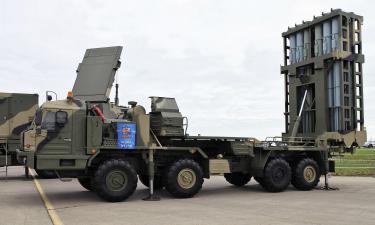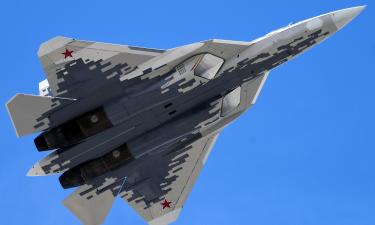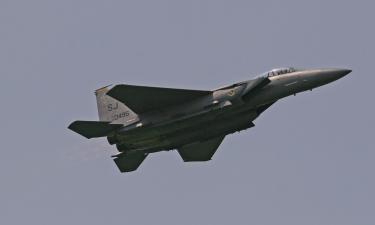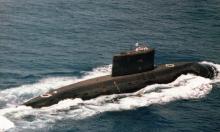Ukraine is Europe's chance not to become USA's colony
Can one treat the events in Ukraine as a serious, but still a local civil conflict, mostly caused with social, rather than national reasons? Is the war in the Donbas region a consequence of large-scale geopolitical clashes? Chairman of the geopolitical center Eurasia-Sofia, Petko Ganchev, wrote an article on the subject for Pravda.Ru.

Today it is absolutely clear that there is a multipurpose strategic operation being conducted on the territory of the former Soviet Union. Ukraine plays a key role in the operation. Why Ukraine?
It is an open secret that the West has always wanted to master the vast territories of Russia and Eurasia, the axial space of the Earth, with its enormous natural resources. To achieve this goal, there was the outer belt (Turkey, Pakistan, South Korea, Japan) built around Russia-Eurasia after the Second World War. The inner belt (Georgia, Moldova, Lithuania, Latvia, Estonia) was built after the collapse of the USSR.
Successively, after the Cold War, almost all Eastern European countries - Soviet satellites - were admitted to NATO under the condition of their membership in the European Union. But the West did not become closer to Russia's western borders. There were two Russia-friendly countries left - historically, culturally and economically - Belarus and Ukraine.
Belarus is closely tied to Russia ethnically, culturally and economically. Ukraine with its failed state organization was a weak link. The reason for that is about the regions, from which Ukraine was created after World War II (1945). During previous historical eras of civilization, these regions were formed in different civilizational habitats, with different religious and value systems.
In his famous book "The Clash of Civilizations and the Remaking of World Order" by Samuel P. Huntington, the author described Ukraine as one of civilizational "splits," where one can expect clashes, i.e. wars. That is why Ukraine was chosen by the United States as the key for the implementation of the multi-purpose strategic operation. In the Middle East, the United States has always used monarchies from the Middle Ages as allies - Saudi Arabia and Qatar. In the case of Ukraine, the most loyal ally of the United States was Poland. The country was used to train "Right Sector" fighters and other figures from anti-Russian ultranationalist structures.
What are the main objectives and directions of this geo-strategic operation, the implementation of which began immediately after the U.S. was forced to freeze its activities on the Syrian-Iranian direction?
First and foremost, the goal is to strike a blow on Russia as the most active U.S. geopolitical rival in the new millennium. When Ukraine goes off Russia's orbit, the U.S. will implement several geostrategic objectives:
- to move air defense systems and other NATO systems closer to Russian borders to thus neutralize its defense, including the nuclear capability;
- to undermine the Russian economy by terminating its relations with the economy of Ukraine (Poroshenko has already ordered, following instructions from the U.S. to cease cooperation with the Russian defense industry);
- to burden the budget of the Russian Federation with bigger spending to maintain refugees from Ukraine and substitute imports from Ukraine;
- to close Russia's gas and oil pipelines to the EU to thus block the inflow of foreign currency in the Russian economy;
- to prevent the process of the creation of the Customs Union and the Eurasian Economic Union;
- to destabilize the political system in Russia, accusing its leadership of what is happening in Ukraine;
- to stop or minimize the economic cooperation between Russia and the EU;
- to sow distrust between Russia and other BRICS countries - Brazil, India, China, South Africa.
Secondly, the U.S. plans to strike a blow on the European Union (EU), which, along with China, acts as a major competitor in the economic sphere. The EU needs to be reminded of his secondary role. The United States sought to confirm the assessment of world's most prominent Russophobe Brzezinski in his book "The Grand Chessboard" (1997), according to which the EU was a "U.S. protectorate." For the U.S. it is vitally important to strengthen the economic dependence of the EU in light of the signing of the "Transatlantic Free Trade Agreement" and turn the EU towards the consumption of American shale gas. In this regard, the EU is the most developed market. To achieve this goal, Ukrainian company Naftogaz (the largest company in Ukraine) becomes the property of a new consortium, whose leadership includes the son of U.S. Vice President Joe Biden and former Polish President Kwasniewski.
At the same time, Chevron starts preparing shale gas production in south-eastern Ukraine - in the areas of the town of Slavyansk and Kramatorsk. Chervon, directly or indirectly, through the European Commission, puts pressure on Bulgaria, forcing the country to abandon the South Stream project. At the same time, the U.S. continues to put pressure on France, to make the country freeze the sale of two Mistral helicopter carriers to Russia. France's largest bank PNB faces a fine of $10 billion for violating the financial embargo that the U.S. put on Cuba, Sudan and Nicaragua. At the same time, the United States, with its national debt of 17 trillion dollars and GDP of 14 trillion, prepares to grant NATO's Eastern European members $1 billion for new weapons.
Fortunately, on the "grand chessboard" of world civilization, the U.S. does not play against virtual opponents. The geo-strategy of the United States does not unfold similarly to Desert Storm Operation from 2003. Today, the USA is playing against experienced players. Russia is rising after the disgrace of the Yeltsin era, and the EU becomes increasingly aware of the fact that the only chance to survive is hidden in the slogan "More Europe for Europeans!"
The last elections to the European Parliament have confirmed the trend. Hitherto, with so many large-scale geopolitical operations after World War II (Korea, Cuba, Vietnam, Iraq, Afghanistan, etc.), the U.S. has not been able to boast of considerable achievements. Through all those wars, as George Friedman says in his book "The Next 100 Years," America has stimulated the growth of the national economy. America was gradually and steadily evolving from a manufacturing economy to the economy of a military-industrial complex. In history, such a condition has always heralded the end of any empire.
Petko Gancev
Bulgaria
Pravda.Ru
Subscribe to Pravda.Ru Telegram channel, Facebook, RSS!





